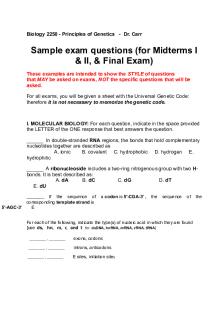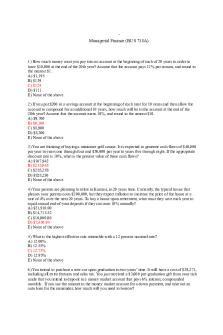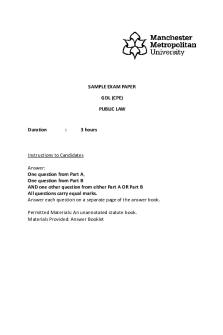Prep-BUL-Example Exam Questions PDF

| Title | Prep-BUL-Example Exam Questions |
|---|---|
| Author | Harpreet Singh |
| Course | Business Law |
| Institution | University of Toronto |
| Pages | 6 |
| File Size | 168.7 KB |
| File Type | |
| Total Downloads | 110 |
| Total Views | 148 |
Summary
Prep questions with solutions for Business Law...
Description
Business Law Exam Question Examples
Chartered Professional Accountants of Canada, CPA Canada, CPA are trademarks and/or certification marks of the Chartered Professional Accountants of Canada. © 2020, Chartered Professional Accountants of Canada. All Rights Reserved. 2020-05-26
Business Law
Exam Question Examples
EXAM QUESTION EXAMPLES The following are examples of examination questions, with solutions for your reference. These questions are similar to what you will see on the final examination, but this document does not reflect the actual length and content of the examination. 1. Indicate whether each of the following independent statements is correct. Explain your responses. a) Under strict liability, the person who caused the injury is liable only if fault attaches to their action. b) Under the principle of vicarious liability, an injured customer can recover damages from either the employer or the employee who caused the injury, but not both. c) A tort occurs only when a person’s actions inadvertently or unintentionally cause a loss to the other person or their property. d) The standard of care expected from a professional is higher in their area of expertise than that expected from an ordinary reasonable person. Solution: a) Incorrect. Under strict liability, the person who caused the injury is liable, regardless of whether any fault attaches to that person’s actions. b) Incorrect. While vicarious liability makes the employer liable for torts committed by an employee in the course of the employee’s work, the employee remains personally liable in tort. c) Incorrect. Torts may also involve intentional conduct; for example, assault and battery, trespass to land, false imprisonment, nuisance, or defamation. d) Correct. First, a professional must have the skills and abilities that one would expect from an expert in that field. Second, a professional must exercise these skills and abilities as a reasonably prudent member of the profession would.
2. Examine each of the following independent situations. Identify whether each raises issues with regard to the law governing the formation of contracts. For each situation, first clearly state the applicable legal rule(s), and then apply the legal rules to the facts of the situation. a) Randolf Singh, a minor, ordered some gaming software on the Internet from GS Inc. (GS). GS accepted the order and charged the credit card that Randolf provided. Just prior to shipping the order, GS learned that Randolf was a minor and repudiated the contract. Randolf wishes to sue GS for breach of contract. b) Harry Boyd, the plaintiff in an action, was attempting to enforce a contract in which the defendant, Kris Sures, agreed to sell Harry his property, Blackacre, for $100,000. As proof of the contract, Harry provided a letter that he wrote to Kris
2/6
Business Law
Exam Question Examples
and signed accepting the offer. Explain whether the court will accept Harry’s letter as proof of the contract of sale of the land. Solution: a) Unless a contract is for necessaries or for the benefit of the minor, it is voidable at the option of the minor — that is, the other party remains bound by the contract until the minor repudiates it. GS does not have the option of repudiating the contract and is bound by the contract until Randolf repudiates it. b) Contracts for the sale of land must be evidenced in writing to satisfy the Statute of Frauds. The writing need only be signed by the person trying to deny the existence of the contract. Since Harry is trying to prove the existence of the contract, the writing needs to be signed by Kris. Since it is signed by Harry, the court will not accept this as proof of the contract of sale of the land.
3. Jon Lowe and Dan Denysios are partners in a home furniture business, JD Home Furniture (JDHF). Jon looks after the retail selling and Dan deals with the wholesale purchasing. Because of their respective areas of expertise, if either of them should die, JDHF would face severe challenges. After discussion, Jon and Dan agreed to purchase a $500,000 life insurance policy on each other in order to provide some cash flow to the other partner in case such an event should occur. Jon suddenly died, and the insurer, Full Life Insurance Co., refused to indemnify Dan. Required: Explain the legal rules that would apply in this situation and explain the likely outcome. Solution: In a life insurance contract, the insurable interest is the amount of the policy. There must be a business relationship or a family relationship between the beneficiary and the insured person. If it is a business associate whose life is insured, his or her written consent is also required. The insurance policy is for $500,000, and this is the insurable interest of Dan in the life of Jon. Dan and Jon had agreed to take out life insurance on each other; however, it does not seem that they gave their consent in writing. This is required for
3/6
Business Law
Exam Question Examples
insurance on the life of a business associate. Consequently, Full Life Insurance Co. could refuse to pay out on the policy to Dan. 4. Song Li has a one-person firm, Accounts Now. Song hires Hedwig VanDramar to install new accounting software, to configure the software for her professional needs, and to input all the data from Accounts Now clients into the computer for use with the new software. Hedwig has just done the same work for UR Accountants. Song and Hedwig agree that Song will pay Hedwig $4,000 per month for the work and that it will be done over three months, from January 1 to March 31. At the end of the first month, Hedwig receives a cheque for $2,500. Hedwig reminds Song that they had agreed she would be paid $4,000 per month. Song replies that she withheld income tax and Canada Pension Plan contributions and deducted employment insurance and workers’ compensation premiums from Hedwig’s cheque. Required: a) Evaluate whether Hedwig is an independent contractor. b) Explain whether Song should have deducted income tax and Canada Pension Plan contributions and employment insurance and workers’ compensation premiums from Hedwig’s cheque. Solution: a) An independent contractor is an independent, self-employed person who is employed to perform a specific function, to achieve a specific result. The independent contractor is not subject to the direction, control, and supervision of the other party and therefore is not an employee. It appears that Hedwig has been hired to achieve a specific result — the installation and configuration of an accounting software system. Song will not be directing, controlling, and supervising the work, or the input of the data from the existing client base. Hedwig is an independent contractor. b) Withholding income tax and Canada Pension Plan contributions and deducting employment insurance and workers’ compensation premiums applies to employees. Hedwig is an independent contractor, and so Song does not have to withhold tax and Canada Pension Plan contributions or deduct employment insurance and workers’ compensation premiums.
4/6
Business Law
Exam Question Examples
5. Gutenberg Press Ltd. (GPL) purchased paper from Mainz Paper Mills Inc. (Mainz) through GPL’s agent, Fust Paper Distributors Inc. (Fust). Mainz was supposed to deliver the paper to GPL but because of production problems, the delivery was delayed. Mainz telephoned Fust and said that the delivery would arrive by truck a few hours later in the evening. Fust neglected to tell GPL, and Mainz delivered the paper to the shop during the evening. The paper was left on the loading dock and was damaged by the weather. Mainz refuses all responsibility for the damage because it had told Fust about the delay. Required: Explain whether Mainz is responsible for the damage to the paper that was left on the loading dock. Solution: In the agency relationship, the agent legally represents the principal and acts on behalf of the principal. Because the agent represents the principal, notice to the agent is deemed to be notice to the principal. Fust is the agent of GPL and represents it in its dealings with Mainz. Notice to Fust by Mainz about the delay in the delivery is deemed to be notice to Gutenberg. Mainz is not responsible for the loss.
6. Diane Nguyen wants to develop a travel consulting business. Diane convinced Mara Tanaka, a venture capitalist, to put up 75% of the money, while Diane herself provided 25%. In return, Mara will receive 60% of the profits. Mara will NOT work in the business but will provide advice, expertise, and contacts, as Diane needs, to expand the business. Required: Explain whether Diane and Mara have unwittingly created a partnership. Solution: A partnership will be presumed to exist if one of the following conditions is met: (1) the parties have jointly contributed to the capital to establish the business; (2) they are carrying on a business together with a view to profit; (3) they intend to share expenses, profits, or losses; or (4) they jointly participate in the management of the business.
5/6
Business Law
Exam Question Examples
Diane and Mara have jointly contributed to the capital to establish the business, and they will also share the profits (so, clearly they have a view toward profit). Mara will participate in the management of the business, and Diane will be providing advice, expertise, and access to her business contacts to help the business develop. It appears that Mara and Diane have created a partnership.
6/6...
Similar Free PDFs

Exam, questions
- 1 Pages

Exam Questions
- 9 Pages

Exam, questions
- 7 Pages

Exam, questions
- 9 Pages

Exam, questions
- 62 Pages

Exam, questions
- 8 Pages

Exam, questions
- 5 Pages

Exam, questions
- 5 Pages

Exam, questions
- 2 Pages

Exam, questions
- 10 Pages

Exam, questions
- 2 Pages

Exam, questions
- 24 Pages

EXAM, questions
- 6 Pages

Exam, questions
- 8 Pages

Exam, questions
- 21 Pages

Neuro Exam questions - Past exam
- 12 Pages
Popular Institutions
- Tinajero National High School - Annex
- Politeknik Caltex Riau
- Yokohama City University
- SGT University
- University of Al-Qadisiyah
- Divine Word College of Vigan
- Techniek College Rotterdam
- Universidade de Santiago
- Universiti Teknologi MARA Cawangan Johor Kampus Pasir Gudang
- Poltekkes Kemenkes Yogyakarta
- Baguio City National High School
- Colegio san marcos
- preparatoria uno
- Centro de Bachillerato Tecnológico Industrial y de Servicios No. 107
- Dalian Maritime University
- Quang Trung Secondary School
- Colegio Tecnológico en Informática
- Corporación Regional de Educación Superior
- Grupo CEDVA
- Dar Al Uloom University
- Centro de Estudios Preuniversitarios de la Universidad Nacional de Ingeniería
- 上智大学
- Aakash International School, Nuna Majara
- San Felipe Neri Catholic School
- Kang Chiao International School - New Taipei City
- Misamis Occidental National High School
- Institución Educativa Escuela Normal Juan Ladrilleros
- Kolehiyo ng Pantukan
- Batanes State College
- Instituto Continental
- Sekolah Menengah Kejuruan Kesehatan Kaltara (Tarakan)
- Colegio de La Inmaculada Concepcion - Cebu